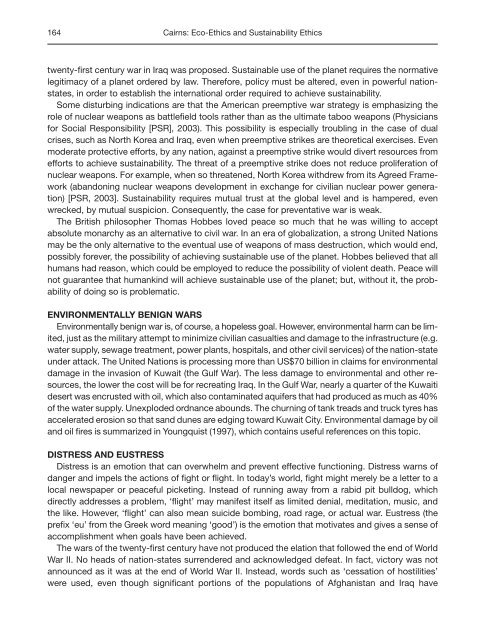View - ResearchGate
View - ResearchGate
View - ResearchGate
You also want an ePaper? Increase the reach of your titles
YUMPU automatically turns print PDFs into web optimized ePapers that Google loves.
164Cairns: Eco-Ethics and Sustainability Ethicstwenty-first century war in Iraq was proposed. Sustainable use of the planet requires the normativelegitimacy of a planet ordered by law. Therefore, policy must be altered, even in powerful nationstates,in order to establish the international order required to achieve sustainability.Some disturbing indications are that the American preemptive war strategy is emphasizing therole of nuclear weapons as battlefield tools rather than as the ultimate taboo weapons (Physiciansfor Social Responsibility [PSR], 2003). This possibility is especially troubling in the case of dualcrises, such as North Korea and Iraq, even when preemptive strikes are theoretical exercises. Evenmoderate protective efforts, by any nation, against a preemptive strike would divert resources fromefforts to achieve sustainability. The threat of a preemptive strike does not reduce proliferation ofnuclear weapons. For example, when so threatened, North Korea withdrew from its Agreed Framework(abandoning nuclear weapons development in exchange for civilian nuclear power generation)[PSR, 2003]. Sustainability requires mutual trust at the global level and is hampered, evenwrecked, by mutual suspicion. Consequently, the case for preventative war is weak.The British philosopher Thomas Hobbes loved peace so much that he was willing to acceptabsolute monarchy as an alternative to civil war. In an era of globalization, a strong United Nationsmay be the only alternative to the eventual use of weapons of mass destruction, which would end,possibly forever, the possibility of achieving sustainable use of the planet. Hobbes believed that allhumans had reason, which could be employed to reduce the possibility of violent death. Peace willnot guarantee that humankind will achieve sustainable use of the planet; but, without it, the probabilityof doing so is problematic.ENVIRONMENTALLY BENIGN WARSEnvironmentally benign war is, of course, a hopeless goal. However, environmental harm can be limited,just as the military attempt to minimize civilian casualties and damage to the infrastructure (e.g.water supply, sewage treatment, power plants, hospitals, and other civil services) of the nation-stateunder attack. The United Nations is processing more than US$70 billion in claims for environmentaldamage in the invasion of Kuwait (the Gulf War). The less damage to environmental and other resources,the lower the cost will be for recreating Iraq. In the Gulf War, nearly a quarter of the Kuwaitidesert was encrusted with oil, which also contaminated aquifers that had produced as much as 40%of the water supply. Unexploded ordnance abounds. The churning of tank treads and truck tyres hasaccelerated erosion so that sand dunes are edging toward Kuwait City. Environmental damage by oiland oil fires is summarized in Youngquist (1997), which contains useful references on this topic.DISTRESS AND EUSTRESSDistress is an emotion that can overwhelm and prevent effective functioning. Distress warns ofdanger and impels the actions of fight or flight. In today’s world, fight might merely be a letter to alocal newspaper or peaceful picketing. Instead of running away from a rabid pit bulldog, whichdirectly addresses a problem, ‘flight’ may manifest itself as limited denial, meditation, music, andthe like. However, ‘flight’ can also mean suicide bombing, road rage, or actual war. Eustress (theprefix ‘eu’ from the Greek word meaning ‘good’) is the emotion that motivates and gives a sense ofaccomplishment when goals have been achieved.The wars of the twenty-first century have not produced the elation that followed the end of WorldWar II. No heads of nation-states surrendered and acknowledged defeat. In fact, victory was notannounced as it was at the end of World War II. Instead, words such as ‘cessation of hostilities’were used, even though significant portions of the populations of Afghanistan and Iraq have















